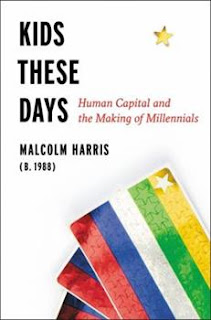"Can you Millennials do anything without your phone? Can you even make a phone call?"
"Do you even know what work is, Millennial?"
Well, OK, Boomer, I used to hear those type of Millennial-hating statements, and as a Gen Xer, I must admit that I found some truth in them. But I failed to look at Millennials from a wider view, and Malcolm Harris helped me do that in Kids These Days: Human Capital and the Making of Millennials (2017).
Harris' main point is that Millennials are working more and getting paid less than any previous generation. Their generation is by far the most educated in history, yet is projected to make less than their parents. Basically, capitalism maximizes labor and diminishes lives away from consumption. In the advent of technology with "smart" devices, Interweb cookies and data in their hands as children, Millennials have been commoditized like no previous generation.
Harris points out that economic success is stacked against young people, and he's right. He delves into the student-loan crisis, and I respond to what he writes about our schools. He writes that the schools get kids to work, work, work under the vague disguise of a "pedagogical mask." Again, I couldn't agree more. It's just so much work, and how much if it is actual education?
Honestly, the schools are pretty obvious about this. They explicitly have kids choose career paths as early as high school, and kids and parents either unwittingly, or wittingly, jump quickly into being human capital. High school can be a dystopia of excessive competition, stress and fear of the future.
What ever happened to actually being educated to become a well-rounded human being? Why do the kids have to be human capital so darn young? What happened to childhoods?
Another huge insight Harris provides is through the lens of human capital and what that means to Millennials. By being commoditized as children, they then can be constantly commoditized their entire lives. Not only will they have tech jobs, but they "unwind" and find their entertainment through tech and their sharing their data with corporations and conglomerates.

No comments:
Post a Comment